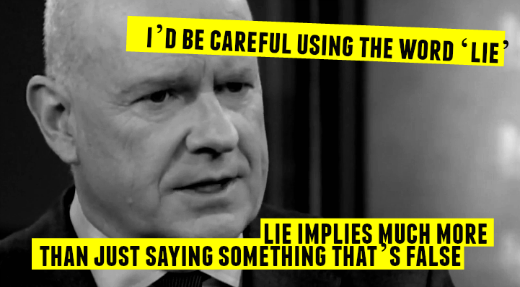Continuing our conversation from before Christmas about how the press intends to cover the lies of President Trump, I wanted to share the following quote from this past weekend’s episode of the Meet the Press. This is how Wall Street Journal editor-in-chief Gerard Baker responded to a question posed by Chuck Todd about how aggressively, if at all, his paper would be calling out Trump’s lies.
“I’d be careful about using the word, ‘lie,” Baker said. “‘Lie’ implies much more than just saying something that’s false. It implies a deliberate intent to mislead… when Donald Trump says thousands of people were on the rooftops of New Jersey on 9/11 celebrating, thousands of Muslims were there celebrating, I think it’s right to investigate that claim, to report what we found, which is that nobody found any evidence of that whatsoever, and to say that.”
“I think it’s then up to the reader to make up their own mind to say, ‘This is what Donald Trump says. This is what a reliable, trustworthy news organization reports. And you know what? I don’t think that’s true.’ I think if you start ascribing a moral intent, as it were, to someone by saying that they’ve lied, I think you run the risk that you look like you are, like you’re not being objective.”
“And I do think also it applies — this is happening all the time now, people are looking at (what) Donald Trump’s saying, and saying, ‘This is false. It’s a false claim.’ I think people say, ‘Well, you know what? Hillary Clinton said a lot of things that were false.’ I don’t recall the press being quite so concerned about saying that she lied in headlines or in stories like that.”
Putting aside for the moment the false equivalence between Trump and Secretary Clinton, of all the responses I’ve seen thus far to this statement by Baker, the best comes from veteran newsman Dan Rather. Here’s what Rather had to say on Facebook.
A lie, is a lie, is a lie. Journalism, as I was taught it, is a process of getting as close to some valid version of the truth as is humanly possible. And one of my definitions of news is information that the powerful don’t want you to know.
So this statement from the editor in chief of the Wall Street Journal about how his paper will report on Donald Trump’s potential (likely?) future lies is deeply disturbing. It is not the proper role of journalists to meet lies —especially from someone of Mr. Trump’s stature and power — by hiding behind semantics and euphemisms. Our role is to call it as we see it, based on solid reporting. When something is, in fact, a demonstrable lie, it is our responsibility to say so.
There is no joy in taking issue with the Journal’s chief editor. His newspaper is a publication for which I have deep respect for the overall quality of its reporting. But, as I have said before and will say as long as people are willing to listen, this is a gut check moment for the press. We are being confronted by versions of what are claimed to be “the truth” that resemble something spewed out by a fertilizer-spreader in a wind tunnel. And there is every indication that this will only continue in the Tweets and statements of the man who will now hold forth from behind the Great Seal of the President of the United States.
Some journalists and publications will rise to the occasion. Some will not. You as the paying, subscribing public, can use your leverage and pocketbooks to keep those who should be honest brokers of information, well, honest.
To its credit, the Washington Post also went on the record about Baker’s comments. After stating that “the news media are simply unprepared for the challenges the Trump presidency will pose to us,” the Post’s Greg Sargent called Baker’s statements “worrying.” What Baker said, according to Sargent, “suggests an unwillingness or an inability to entertain the possibility that we may be looking at something new and different here.” Sargent then focused in on Baker’s comments concerning Trump’s repeated claim that “thousands and thousands” of American Muslims “celebrated” the 9/11 attacks. “This was not some casual falsehood,” said Sargent. “This lie was key to a months-long campaign of vilification and scapegoating of Muslims that in turn was central to his broader appeal. As Glenn Kessler pointed out at the time, Trump repeatedly refused to entertain any evidence to the contrary even when it was directly presented to him. Indeed, his campaign team responded to media efforts to present that contrary evidence by accusing the media of covering up the truth. In this and many other instances, Trump barely even tried to make a fact-based case for his version of reality. Rather, he seemed to be trying to obliterate any possibility of shared agreement on what constitutes an authoritative source, and even on reality itself.” Sargent then went on to further make his point by focusing on Trump’s birther claims. Here’s what Sargent had to say.
…Trump himself originally conceived of it as a means of entree into the political consciousness of GOP primary voters. It was debunked countless times over many years. Yet Trump kept his birther campaign going all throughout anyway.
In these cases, was Trump lying? The standard that Baker adopts — that there must be a provable intent to mislead — seems woefully inadequate to informing readers about what Trump is really up to here. Sure, it’s possible that Trump continued to believe these things after they were debunked. We cannot prove otherwise. But so what? If we accept that it’s possible to prove something to be false — which Baker does, judging by his own comments — then we presumably also accept that this can be adequately proved to Trump. And so, Trump is telling a falsehood even though it has been demonstrated to him to be a falsehood.
If we don’t call that “lying,” or if we don’t squarely and prominently label these claims as “false,” don’t we risk enabling Trump’s apparent efforts to obliterate the possibility of agreement on shared reality? We’re already seeing a preview of how this will work in practice when Trump is president. On multiple occasions, Trump has dubiously claimed credit for jobs he has supposedly “saved,” and the headlines have tended to reflect his claims without also informing readers that those claims are unverified or open to doubt. People don’t always take the time to learn the details. Even when they do, if news orgs don’t take a clear stand on what is true and what isn’t, confusion can often follow…
For what it’s worth, I’m very much in agreement. I don’t know how much it helps to have the establishment press call Trump a liar, but I think it’s imperative that we not equivocate. As I said the last time we chatted on this issue, while I appreciate the fact that our professional journalists are struggling with how to be precise with their language, and respect the fact that they take their positions as custodians of the truth seriously, I feel as though, while they’re tied up with the minutia of how to respond responsibly to this new world that we’re facing, the other side just keeps right on going, spreading lies and dissemintating conspiracy theories without fear of reprisal. And people, I think, deserve to know that they’re being lied to.
Donald Trump just didn’t change his mind about “draining the swamp.” As we can see from who he named to his cabinet, he was merely lying when he told the American people that he’d eschew lobbyists and career politicians. And Donald Trump just didn’t change his mind about reopening America’s coal mines. He merely lied when he assured the people of West Virginia that he would. And he knew damn well the whole time that Obama was born in the United States, but he kept right on lying about it because, as Sargent says, it kept him in the spotlight and grew his base of support among the know-nothing class. Trump’s entire administration is built on a broad foundation of lies, and to say otherwise is not only a disservice to the American people, but an invitation for those inclined to do so to push us even further into the realm of fantasy, where global climate change does not pose a threat and Democrats operate pedophilia rings in secret tunnels beneath DC pizza parlors. These are dangerous times, and we cannot abide equivocation. Too much is at stake.













5 Comments
His mention of Clinton’s “lies” makes me question whether he’s suited to run a newsroom.
truthiness has become lying-like.
I was going to add WSJ to my list of publications I pay for on principle because they do do real journalism, even if I very often strongly disagree with their editorial bias. But this made me put my credit card back in my wallet.
Baker has a point that making a false statement isn’t necessarily the same thing as lying (i.e., making a false statement _with the intent to deceive_). But if you make a false statement repeatedly, for political gain, that has been firmly & clearly debunked and do not unequivocally retract that statement and own your mistake, then clearly you have made that statement with the intent to deceive. Refusing to call that a lie is cowardly.
Libel concerns perhaps. Writing “President Twitter said something that is false,” when such is demonstrable, is safe. Writing “President Twitter said something that was false and he knew it was false when he said it,” if not completely demonstrable, with corroboration, is risky. Writing “President Twitter said something that turned out not to be the case,” is being a kiss ass.
“Equivocation leads to Normalization”